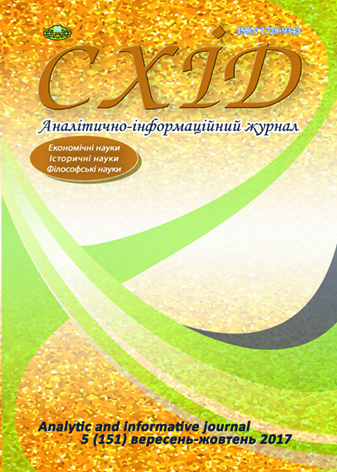Narrative as a component of discursive reality
DOI:
https://doi.org/10.21847/1728-9343.2017.5(151).117405Keywords:
narrative, discourse, reality, interpretation, sense, social experienceAbstract
The article is devoted to examination of narrative as a component of discursive reality, which forms specific forms of perception of social experience. The article is also based on the using the discourse analysis techniques, and the content of the narrative as a component of discursive reality is considered. The essence of the narrative as a multidimensional phenomenon which can develop the meaning is discovered. There is the description of this phenomenon as a tool for constructing the identity. The scientific legitimacy of introducing new cognitive strategies into the modern methodology that contribute to the construction of a new social reality is substantiated.
The author considers that narrative determines the process of social construction and semantic basis of being. Its reality opens the great possibilities for analysis, it gives the complex material for clarifying how narrative turns out, forming a discursive reality and presenting the spheres of social life. For social philosophy, the narration is a practice, where the experience constitutes not only social action, but also the person. According to research narrative is presented not only as a way of self-identification, but organizing form of individual experience.
It is proved that narrative as a main and fundamental component of discursive reality gives certain sense to the human actions and practices of identification.
Thus, the analysis of the narrative as an integral part of discursive reality has shown that this phenomenon with all its features transforms and constitutes reality. It should be added that social reality is the result of the interpretation of subjects, which takes place within the semantic horizon of culture.Downloads
References
Berger, P. and Lukman, T. (1995), The social construction of reality [translat.], Меdium, Moscow, 336 p. (rus).
Berk, P. (2004), History of events and revival of narrative [translat.], in: Nоvі pеrspektyvy іstоrіоpysаnnia, Nіkа-Tsеntr, Kyiv, 344-363. (ukr).
Brokmeir, I. & Kharre, R. (2000), Narrative: problems and promises of an alternative paradigm, Vоprosy filosofii, №3, 29-42 (rus).
Danto, A. (2002), Analytical philosophy of history [translat.], Ideia-Prеss, Moscow, 290 p. (rus).
Liotar, Zh.-F. (1998), The postmodern condition [translat.], Аleteya, St.Petesburg, 278 p. (rus).
Riker, Paul (2004), Memory, history, oblivion [translat.], Izdatelstvo gumanitarnoi literatury, Moscow, 728 p. (rus).
Trotsuk, I.(2004), Narrative as an interdisciplinary methodological construct in the modern social sciences, Vеstnik RUDN. Sеriia «Sotsiologiia» (Moscow), №6-7, 56-74. (rus).
Trubina, E.G. (2004), The Science of the Narrative: Foundations, Problems, Perspectives, in: Маtеrialy k spеtsialnomu kursu. Yekаtеrinburg, 156 р. (rus).
Fuko, М. (2003), Archeology of knowledge, Vyd-vо Sоlоmii Pаvlychko «Оsnovy», 326 p. (ukr).
Carr, D. (1986), Narrative and the Real World: An Argument for Continuity, History and Theory. Vol. 25. № 2. 117-131. DOI: 10.2307/2505301.
Mink, L.O. & Canary, R.H. [ed.] and Kozicki H. [ed.] (1978), Narrative Form as a Cognitive Instrument, The Writing of History. Literary Form and historical Understanding, Madison, 1978. 129-149 (eng).
Torfing, J. (2005), Discourse Theory: Achievements, Arguments, and Challengers, Discourse Theory in European Politics. Identity, Policy and Governance. Palgrave Macmillan, р. 1-32. DOI: 10.1057/9780230523364_1
Downloads
Published
How to Cite
Issue
Section
License
Copyright (c) 2017 Halyna Dyakovska

This work is licensed under a Creative Commons Attribution-NonCommercial-NoDerivatives 4.0 International License.
1. Authors bear responsibility for the accuracy of facts, quotations, numbers and names used.
2. Manuscripts are not sent back.
3. The publisher does not always agree with the authors' opinion.
4. The authors reserve the right to authorship of the work and pass the first publication right of this work to the journal under the terms of a Creative Commons Attribution-NonCommercial-NoDerivatives 4.0 International License. This license allows others to distribute (copy) the published work for non-commercial purposes, provided there is mandatory attribution to its authors and a link to the first publication in our journal.
5. The authors have the right to conclude separate supplement agreements that relate to non-exclusive work distribution in the form in which it has been published by the journal (for example, to upload the work to the online storage of the journal or publish it as part of a monograph), provided that the reference to the first publication of the work in this journal is included.

